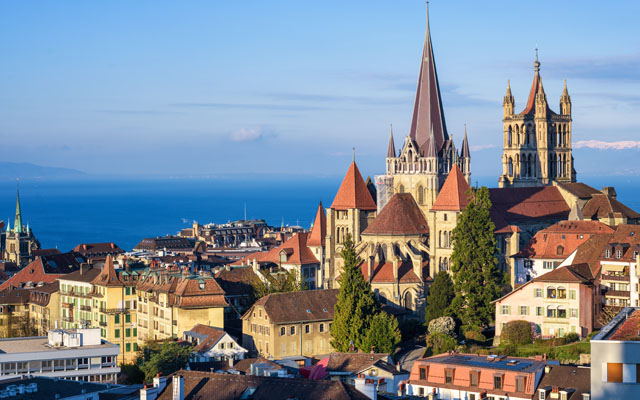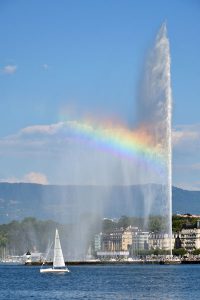From picturesque terraced vineyards and snowy slopes, to indulgent spas and intelligent tours of a world-renowned science lab, Switzerland has far more to offer top achievers than fine watches and rich chocolates
Switzerland may be most known and loved for its majestic mountains, timepieces, cheese and chocolates, but the Switzerland Convention & Incentive Bureau (SCIB) wants to broaden event planners’ view of the aspirational destination, so that even more diverse experiences can be crafted to provide a truly memorable travel reward for top achievers.
A key catalyst in its push for deeper exploration of the country is the well-oiled public transport network, covering buses, trams, trains and ferries, that not only allows for convenient group movement, it also enables organisations to minimise their travel carbon impact.

Barbra Albrecht, head of meetings & incentives worldwide and member of the Management Board with SCIB, told TTGmice that it did not matter where groups stayed, as “Switzerland is quite small” and “you can be on a mountaintop in an hour, and explore a top attraction in another city in the next”.
Albrecht hopes to encourage Asian corporate incentive groups to discover unknown sides of Swiss destinations like Zurich, Geneva, Lausanne, and Lavaux.
Zurich, for example, has plenty of play up its sleeve, but international travellers typically see only its serious side as a financial and business hub.
Anita Berardi, market manager for South-east Asia, Korea and global accounts at Zurich Tourism, said: “Zurich has a lot of things to do, but visitors don’t really know about them.”
Travellers can explore the Lindt Home of Chocolate, where they can learn about chocolate evolution and production while sampling chocolate products; Mühlerama, an ancient industrial mill and a museum of food culture, where they can bake bread; and Kunsthaus Zürich, renowned as the largest museum of fine arts in the country. The city’s scenic side can be appreciated on lake cruises or over a leisurely lunch by Lake Zurich.
“As the largest city in Switzerland, it has the highest number of hotels and is a very good centre to start off day excursions around the country,” remarked Berardi.
Properties like The Dolder Grand, a resort specialising in wellness, are ready to welcome corporate groups.
According to Fabian Gruetter, director of revenue, reservations groups, The Dolder Grand is a hit with corporate clients, as it offers a plethora of activities, such as free-to-use e-bikes, ice rinks (in winter), and spa facilities as well as paid ones like the nine-hole golf course. All five restaurants can customise dining arrangements, while groups have 15 function rooms to choose from.

Geneva is another city “trapped in a cliché”, opined Kristelle Charrê, public relations and market manager for South-east Asia and North America with Geneva Tourism & Conventions Foundation. Often regarded as a business city, Geneva has, in fact, “a lot of unique attractions for MICE groups”.
“Top achievers will get to craft fine watches and learn to make delicious chocolates here in Geneva, but there are also things that are incredibly special waiting to be discovered,” added Charrê.
One example is the CERN Science Gateway, an education and outreach centre. Opened in October 2023, the centre is part of the world-renowned laboratory for particle physics. Here, visitors get to marvel at multimedia exhibits, join hands-on workshops, attend science shows and events that blend science and culture, and tour CERN facilities. The insightful tour can be paired with private gatherings hosted at the Science Gateway Auditorium, and Globe of Science and Innovation.
Charrê recommends that corporate groups take a day to meet and do business in Geneva, then reserve at least a full day to “take in the sun on a cruise down Lake Geneva, see the Jet d’Eau (an iconic fountain in Lake Geneva that shoots a powerful jet 140m into the sky), and go for wine-tasting in the nearby vineyards”.
From Geneva, groups can hop on a short train ride to Lausanne, and see how the landscape changes to multiple layers of modern and ancient architecture cut into hills. Journey through the old town, stopping to pick up local produce like cheese and fruits or fashion accessories crafted by local designers. Soon, the spire of the Gothic Cathedral of Notre Dame of Lausanne will loom into view. Conquer the steps and be rewarded by a serene garden fronting the church, and from here inhale the beautiful vistas of Lausanne.
This laid-back, traditional side of Lausanne is charming, but the city is also renowned as the Olympic Capital and is home to more than 55 international sports federations and organisations. This makes it an ideal learning ground for groups with a sports specialisation. The Olympic Museum is not to be missed, and exclusive social events with private tours of the permanent exhibits can be hosted within.
With Lausanne celebrating its 30th anniversary as the Olympic Capital this year, free public events, such as Euro 2024 fan activities and group fitness classes, have been arranged to mark the occasion.
As further proof of Albrecht’s claim that one could easily see various landscapes in a single day across Switzerland, a short train ride from Lausanne whisks groups off into the Lavaux Vineyard Terraces, a UNESCO World Heritage Site. The world moves slowly here, which is perfect because the blend of lush terraces, clear blue skies, sparkling waters of Lake Geneva, and ragged alps in the distance is a sight that demands unhurried admiration.
Clos de la République, a vineyard that dates back to the 16th century and the oldest family business in Switzerland, welcomes private groups into its 35-hectare estate. Its many outdoor spaces and indoor venues have hosted conferences, teambuilding activities, and dinner parties.
From this picture postcard destination, shift into high gear and head up to the year-round winter wonderland that is Glacier 3000, where teambuilding games can be conducted in the snow.
Beyond the many shades of fun that Switzerland dishes out, the country also presents opportunities for corporate groups to achieve their sustainability goals.
Charrê said it would be easy for well-meaning groups to incorporate CSR elements into their programme since living sustainably “is part of the Swiss DNA”.
Groups could visit Swiss national parks and participate in conservation work with specialists who will explain why they do what they do. In Geneva, for instance, groups could enjoy farm-to-table dining in the countryside, and work with organisations that provide livelihood to people with disabilities.
SCIB’s MICE manager, South-east Asia, Dominique Oi, recalled having arranged industry visits to a power station and a hydropower plant for corporate groups from energy industries. “There is a lot of curiosity around Switzerland’s sustainable practices that go beyond recycling, and especially how the country has been harnessing energy in sustainable ways before this concept became trendy,” she said.
So, while the efficient Swiss Travel System and the convenient Swiss Travel Pass make it possible for corporate groups to touch several destinations in a single day, the array of experiences in each destination calls for a slower pace that allows top achievers to truly relish every moment.





















